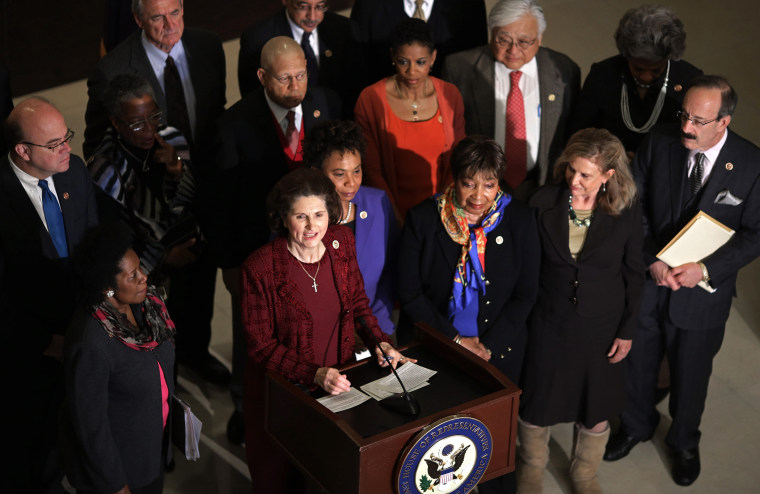Half a century after the 36th president launched a “War on Poverty,” its victor is still up for debate.
Dueling press conferences on Wednesday to mark the 50th anniversary of Lyndon Johnson’s State of the Union address, in which he declared “unconditional war on poverty,” revealed starkly different opinions of its success.
Ask a Democratic lawmaker, and you’ll likely hear that the programs created to help America’s neediest are working, but that the “war” is far from over. Ask a Republican--poverty won.
“While this war may have been launched with the best of intentions, it’s clear we are now engaged in a battle of attrition that has left more Americans in poverty that at any other point in our nation’s history,” said Florida Republican Rep. Steve Southerland, chairman of the House Republican Study Committee’s anti-poverty Initiative, in a news conference Wednesday. “Clearly the big-government ideas of the past need to be improved, and aren’t working to the extent that they should.”
The Florida lawmaker gained notoriety last year for authoring a controversial amendment that would require able-bodied adults to work or volunteer at least 20 hours a week in order to qualify for food stamps. His proposal narrowly passed the House without any Democratic support as part of a bill that would cut nearly 4 million people and $4 billion from the food stamp program in 2014. Critics believe his proposal lacks resources for job training programs, and that the requirement would create an unnecessarily high bar for adults who need government assistance to feed their families.
When asked about the irony of having Southerland, a lawmaker so closely associated with cuts to America’s social safety net, leading the House Republican effort to combat poverty, House Speaker John Boehner told reporters Wednesday that Southerland’s work requirement was “a step in the right direction.”
But statements like that and opposition to programs like Medicaid, Head Start, and longterm-unemployment insurance have given the GOP a reputation of favoring the rich, one solidified in the 2012 election when failed-presidential candidate Mitt Romney made his infamous 47% remark. Southerland cast aside the perceived empathy gap as “political banter" and pointed to the work of Virginia Republican Rep. Frank Wolf, who is resigning this year, as evidence.
“Every 90 days, Frank meets with every food bank in his district,” said Southerland to the roomful of reporters. “I dare one of you to print that tomorrow.”
Rather than supporting government programs that he feels haven’t done enough to reduce the number of those living in poverty, Southerland, joined by Reps. Steve Scalise, Dave Camp, James Lankford, and Marlin Stutzman, advocated for policies that grow jobs, improve education and training, and support “two-parent families.”
“Big government can’t win the war on poverty as long as it’s waging a war on jobs,” said Stutzman. “Americans need paychecks, not welfare; opportunity, instead of dependence.”
Steps away in the Capitol, members of the Congressional Black Caucus joined President’s Johnson’s oldest daughter to share a very different vision of the “war on poverty.” Not only should the fight continue, they charged, but the war on Republican recalcitrance should be fought harder than ever.
“Programs such as the Economic Opportunity Act, the Social Security Act, the Food Stamp Act, the very foundation of social safety nets that millions of Americans rely on today are being attacked,” said Texas Democratic Rep. Eddie Bernice Johnson. “But we stand here to say, there is an American that will not allow these programs to go by the wayside.”
The pressers came on the heels of a White House report, released Tuesday, that found the percentage of the U.S. population living in poverty has fallen from 25.8% in 1967 to 16.0% in 2012, using a measure that takes tax credits and other benefits into account. While Southerland conceded the percentage of people living in poverty has decreased over the last 50 years, he said he did not “agree” with the data.
“When we start talking about invalidating, and saying it’s good that 46 million Americans are living in poverty, I think that’s a sad day in America,” he said.
Later in the day, Florida Republican Sen. Marco Rubio, who gave a preview of his views over the weekend in a Web video, waded into the partisan waters. The conservative firebrand and possible 2016 presidential candidate blasted the government’s “failed programs” and Democratic efforts to raise the federal minimum wage.
“Really? That is their solution to what President Obama has identified as the defining issue of our time?” Rubio said on Capitol Hill. “The only solution that will achieve meaningful and lasting results is to provide those who are stuck in low paying jobs the real opportunity to move up to better paying jobs. And to do this we must focus on policies that help our economy create those jobs and that help people overcome the obstacles between them and better paying work.
“The war on poverty accomplished neither of these two things," he said.
